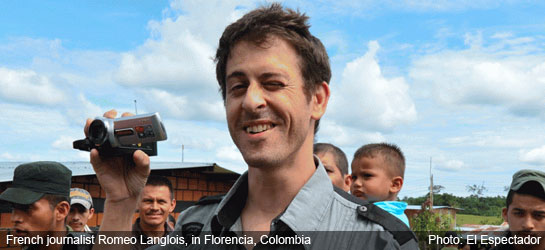
Romeo Langlois said he will continue to report on the conflict between Colombia’s government and guerrilla forces, hours after the French journalist was released from a month-long kidnapping by the FARC.
“What I have is the conviction that we must continue to cover this conflict,” he said upon arriving in Florencia, in southern Colombia, where media and a swarm of local people awaited his release.
Langlois smiled and looked relaxed as he navigated the crowd and answered reporters’ questions.
“The job of a journalist is to cover all sides of the conflict, the guerrillas, the army,” he said. “I hope that the army continues taking people to cover conflict zones. Hopefully there are journalists who also go with the guerrillas to show the daily life of the fighters, because this conflict is not covered.”
Langlois spoke passionately to the crowd and called for a solution to the conflict.
The French reporter had been in the hands of FARC rebels since April 28, when he was captured while embedded with Colombian military to report on an anti-narcotics mission.
A team led by the International Committee of the Red Cross (ICRC), French officials and members of the human rights group Colombians for Peace traveled to a remote town outside of Florencia in the early hours of Wednesday, where the FARC had requested the transfer take place.
“I was never tied up. I was treated like a guest,” Langlois said of his time in captivity.
“They gave me good food and were very respectful,” he added.
Langlois said he found it sad that his kidnapping was needed in order to make people aware of the conflict.
Though he was shot in the arm during the fighting that precipitated his capture, he said he was healing well.
Hostage negotiator and former senator Piedad Cordoba, who was part of the team that secured Langlois’ freedom, called the release “fortunate.”
“There could have been another outcome,” she said from the celebratory gathering in Florencia.
She said the successful negotiations between the ICRC-led group and the FARC could pave the way for further peace talks.
“It is an extremely important humanitarian operation we’re doing today,” she stated, “because it is also paving a space for the possibility of political negotiations.”

